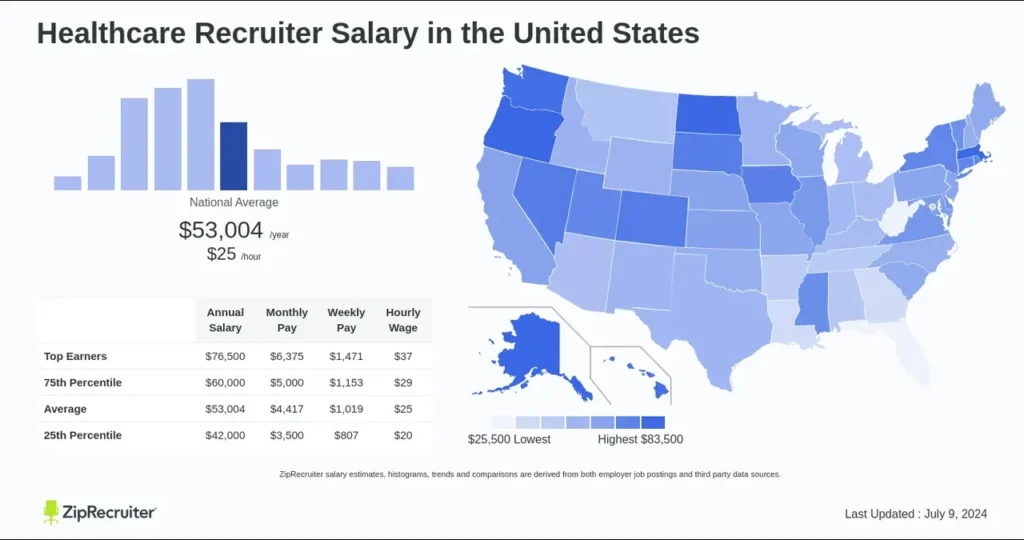Introduction to healthcare recruitment
The healthcare industry is vast and ever-evolving, making it a crucial field for professionals who help connect talent with opportunities. Healthcare recruiters play an essential role in this process, bridging healthcare organizations and qualified candidates. But have you ever wondered how much these vital players earn? Understanding the financial aspects of healthcare recruitment can provide valuable insights into this rewarding career path. Let’s explore what influences their compensation and what aspiring recruiters can expect to make in this dynamic profession.
The role of a healthcare recruiter
Healthcare recruiters play a vital role in connecting healthcare organizations with qualified professionals. Their expertise lies in understanding the specific needs of medical facilities and the qualifications required for various positions.
They actively source candidates, often utilizing databases, social media, and networking events to find potential hires. Screening applicants is another critical aspect. Recruiters assess resumes and conduct interviews to ensure that candidates meet both skill requirements and organizational culture fit.
Building relationships is also essential. They maintain contact with clients and candidates throughout the hiring process, providing updates and gathering feedback. This relationship management helps streamline communication between all parties involved.
Moreover, they stay informed about industry trends. Knowing what skills are in demand allows them to effectively advise clients on competitive compensation packages to attract top talent.
Factors that influence compensation for healthcare recruiters
Several factors play a pivotal role in determining the salary of healthcare recruiters. One primary influence is experience. Seasoned recruiters typically command higher salaries due to their proven track record and deep industry knowledge.
The location also matters significantly. Recruiters working in urban areas or regions with a high demand for healthcare professionals often see better compensation packages than those in rural settings.
The type of healthcare facility can also impact earnings. Recruiters focusing on specialized roles, such as nursing or physician placements, may earn more than those handling general staff positions.
Additionally, the size of the recruiting firm plays a role, too. Larger organizations often provide higher salaries and expanded benefits than smaller firms struggling with budget constraints.
Performance metrics can directly affect compensation through bonuses or commissions tied to successful placements. These incentives motivate recruiters to excel while increasing their overall earning potential.
Average salary range for healthcare recruiters
The average salary for healthcare recruiters varies widely depending on several factors, including experience and location. Generally, entry-level positions start around $40,000 to $50,000 annually.
As recruiters gain experience and specialize in certain areas of healthcare, salaries can increase significantly. Mid-career professionals typically earn between $60,000 and $80,000 per year.
Highly experienced recruiters or those in competitive markets may see salaries soaring to over $100,000. Additionally, some recruiters work on a commission basis alongside their base pay.
Location plays a crucial role as well. Recruiters in metropolitan areas often command higher salaries than those in rural regions due to cost-of-living differences and demand for talent.
Understanding these nuances helps set realistic expectations when entering the field or seeking new opportunities.
Other benefits and perks for healthcare recruiters
Healthcare recruiters often enjoy a variety of benefits beyond their base salary. Many companies offer flexible work arrangements, allowing recruiters to effectively balance their personal and professional lives.
Additionally, performance bonuses can be significant in this field. When a recruiter successfully places candidates in high-demand positions, they may receive extra financial incentives.
Professional development opportunities are also common. Recruiters might have access to training programs or certifications that enhance their skills and boost career advancement prospects.
Health insurance is another important perk. Most organizations provide comprehensive plans that include medical, dental, and vision coverage.
Some healthcare recruitment firms offer generous paid time off policies or wellness programs to promote employee well-being. These perks contribute to job satisfaction and help retain talented professionals in the industry.
Tips for negotiating salary as a healthcare recruiter
Research is key. Before entering negotiations, gather data on industry standards and salary ranges for healthcare recruiters in your area. Websites like Glassdoor and Payscale can be valuable resources.
Confidence plays a crucial role during discussions. Clearly articulate your skills, experience, and the unique value you bring to the organization. A strong personal brand can significantly bolster your position.
Be open about your expectations, but remain flexible. This doesn’t mean undervaluing yourself; rather, it shows you’re willing to find common ground.
Prepare to discuss additional benefits that could enhance your overall compensation package. Whether remote work opportunities or professional development funds, these perks often hold significant value beyond base salary.
Practice active listening during negotiations. Understanding the employer’s needs allows you to tailor responses effectively while demonstrating collaboration and professionalism.
Conclusion
Healthcare recruitment is a dynamic and rewarding field. Recruiters play a crucial role in connecting qualified professionals with healthcare organizations. Their compensation varies significantly based on several factors, including experience, location, and the specific sector within healthcare they serve.
On average, healthcare recruiters can expect to earn competitive salaries reflecting their expertise and industry contributions. Beyond base salary, many enjoy benefits that enhance their overall compensation package.
Understanding how to negotiate salary effectively can make a significant difference for those looking to enter or progress in this profession. By preparing well and knowing your worth in the market, you position yourself for better financial outcomes.
The landscape of healthcare recruitment continues evolving along with shifts in the industry itself. As demand rises for skilled professionals across all healthcare areas, so does the opportunity for recruiters to grow both personally and financially. Whether you’reconsidering this career path or navigating it, there’s much potential ahead.

